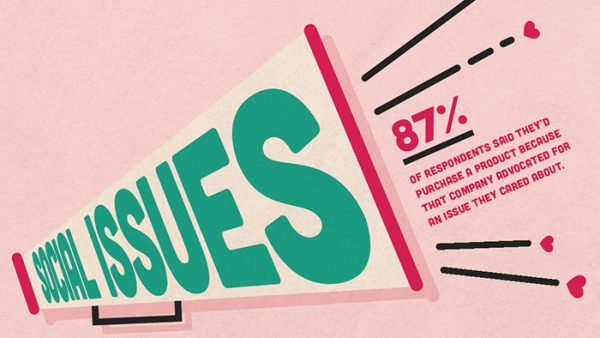
If variety is the spice of life, then we’re living in a habanero society. We’re overwhelmed with choices, which means brands need to keep their cool now more than ever. One wrong move and a longtime loyal customer might switch to a competitor.
Even devotees are switching in these next-brand-up times, for an assortment of reasons:
- A bad customer service experience
- A significant price increase
- Convenience (Hello, free one-day shipping!)
- Brand fatigue
- Evolution, baby (Why doesn’t Brand A come in an easy-to-squeeze bottle like Brand B?)
- Social stance (Brand A’s carbon footprint is Sasquatch-sized, but Brand B’s is just right.)
That first bullet still reigns as one of the most prevalent motives for brand switches, but the last point has stolen headlines as of late. The position a brand takes on social issues will be the Zero Moment of Truth in 2020. Does the company support the #metoo movement?
Is the business eco-friendly? Do they donate to pro-life or pro-choice campaigns? What about immigration – do they employ migrant workers?
Consumers care about these issues, and they want their brands to care, too. According to a recent study commissioned for this issue of Thinking, only 21% of men said a brand’s stance on a social issue would have no impact. Women care even more, with just 16% saying a brand’s stance on a social issue would have no influence on their decision to buy a brand.
According to a study from Cone Communications, 87% of respondents said they’d purchase a product because that company advocated for an issue they cared about, and more than three-quarters (76%) would refuse to purchase a product if they found out a company supported an issue contrary to their beliefs.1
And for brands that choose to stay neutral in hopes of playing it safe, consider this: In a study from the Shelton Group, 86% of consumers believe that companies should take a stand for social issues. Furthermore, 64% of those who said it’s “extremely important” for a company to take a position on a social issue said they were “very likely” to purchase a product based on that commitment.2
What if they ‘mess’ up?
I’m an Apple fanboy. I’d buy every single product they offer if I could afford it. But what if tomorrow’s headline read: “Apple Admits to Secretly Dumping Toxic Sludge Into San Francisco Bay.”
While I would feel terrible about all the pollution, and I’d want Apple to clean it up, I wouldn’t stop using their products because of it. On the other hand, the Apple fangirl in my life – my wife – says she absolutely would stop using Apple products in this contaminated scenario.
Perhaps that’s because women are more willing to try new brands. As you learned in the article about female shopping habits, 34% of women said they occasionally like to try new brands. Fewer men, 22%, say they try new brands every now and then.
It still comes down to customer service.
As much as social issues take the spotlight these days – obviously supercharged on social media – the quality of a product and, perhaps more critical, its customer service, still rule. Spurn a customer – even a brand zealot – and you risk losing them forever.
Consider this example from Bozell President Robin Donovan, who stopped shopping at one of her favorite stores because of a bad customer service experience.
“I bought an expensive dress at this store, among a number of other items, and wore it twice. I was looking in my closet and saw that the braiding across the midriff had ripped partially away. I brought the dress in and asked them if they would fix it. They said, ‘No.’
“I reminded them that it was an expensive dress and they could see for themselves that it had barely been used. They said they didn’t care, and it was not their problem. They weren’t willing to do anything at all and they acted as though I was some kind of creep because I hadn’t bought the dress within the past few weeks and I had the nerve to ask them for help when it started to fall apart. I will never go back.”
Super Simple Tip of the Month:
Be faithful to your loyal customers.
1 Americans Willing to Buy Or Boycott Companies Based on Corporate Values, Cone Communications, 2017.
2 Brands & Stands, Engage for Good, 2018.



